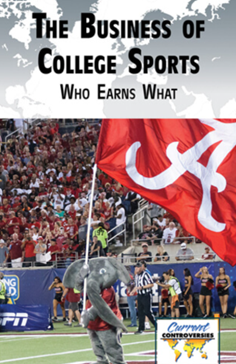The Business of College Sports. Who Earns What.
Greenhaven Publishing.
There is no question that college athletics are rapidly
changing these days and not without its own share of controversy. There are ways to try and keep up with those
changes. One especially was found in
the Book: The Business of College
Sports. Who Earns What. No author only a publisher that compiles
myriad articles and journals produced by some of the great thinkers and
scholars of college athletics.
Inside this relatively short book of about 170 pages, the
reader will find four chapters pertaining to topics such as whether colleges
and universities should even be in the business of college sports. In addition, they also detail chapters including
the question if college coaches are paid too much, is the move to super
conferences good for the sport and finally evaluating the reasonableness of
Name, Image and Likeness. Now, the
book was published in 2023 and thus is current, however, not all essays are immediately
recent as the book includes some topics that while may be interesting could
also be argued as outdated. Of course,
that is the nature of college sports these days. The changes taking place are more rapid than
ever.
We like the discussion of the compensation for college
and university coaches and administrators.
Several essays within that chapter pose strong arguments for each
side. Readers will appreciate the
objectivity that pervades most of the writing style although not true for all contributors. The chapter analyzing the NIL concept seems
to be less of a debate and more a contrition that it is legal now and here to stay. The contributing journals included in that
chapter try to pose some suggestions for how to better regulate the entire
process—something that seems to be sorely lacking as we approach the middle of
this decade although still in the infancy of this new source of player entrepreneurship.
One noted author, Joe Nocera, vehemently argues that
college coaches are well overvalued by their employers and the system that
currently exists and has for a generation.
This comes as no surprise since Nocera also heavily contributed to a
book published in 2017 called Indentured. A full proponent of student athletes
getting their fair share of compensation, Nocera clearly is a believer that
coaches do not need to earn excessive annual salaries particularly at the
expense of other less compensated university employees and the athletes
performing the labor.
One of the latter
chapters poses a pretty good argument for how colleges continue to exploit
athletes despite the advent of NIL. The
scholars of this essay assert that while college athletes are now legally able
to generate and retain compensation for their services it still falls well
short of the millions that the established forces in college sports earn annually. This of course pinpoints mostly white males
and their perceived exploitation of college sports comprised primarily of black
athletes.
A section within the first chapter is titled Team Sports
offer Social and Academic Benefits. While
the content of this essay is interesting it is very general and broad. As a physical education instructor, it reads
like a brief overview of a training manual when discussing topics such as
communication skills, time management and teamwork. This seems to be a questionable choice for
the book. To be clear, these current controversies
series of books are likely written for adolescent audience (although not
necessarily entirely for them) and although this chapter is easy enough to
process, it does not add much to the debate about the ever-changing world of
college football, basketball and other sports.
This is not a book
an ardent fan may seek or recommend to others. That doesn't mean is it is not worth the
read, though. New fans, regardless of age,
may still find some of the chapters useful and helpful in their understanding
of a business that is more complex than meets the eye and is constantly changing. Due to the book’s impartial stance and the ability
to feature essays discussing both sides of the issue it makes for a dry but
likely effective way to get better informed about the controversial business of
college sports and athletics.
· You
might like to read this book if you are interested in learning more about the
business side of college athletics.
· You
might like to read this book if you enjoy reading articles and debates about
the business side of college athletics.
· You
might like to read to read this book if you relish reading about current
controversies and possible solutions.
Read more about Greenhaven Publishing: https://www.greenhavenpublishing.com/title/The-Business-of-College-Sports

Comments
Post a Comment